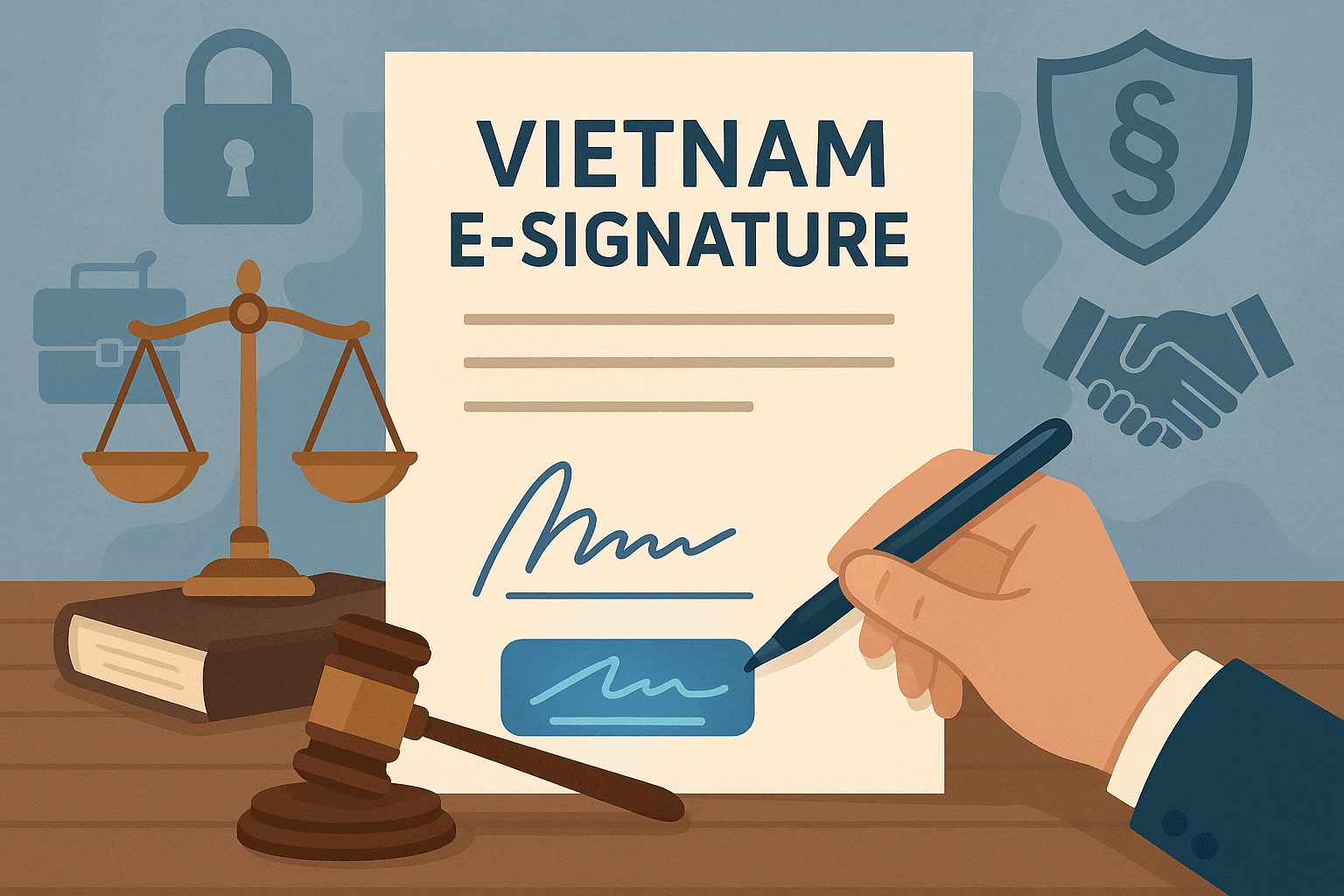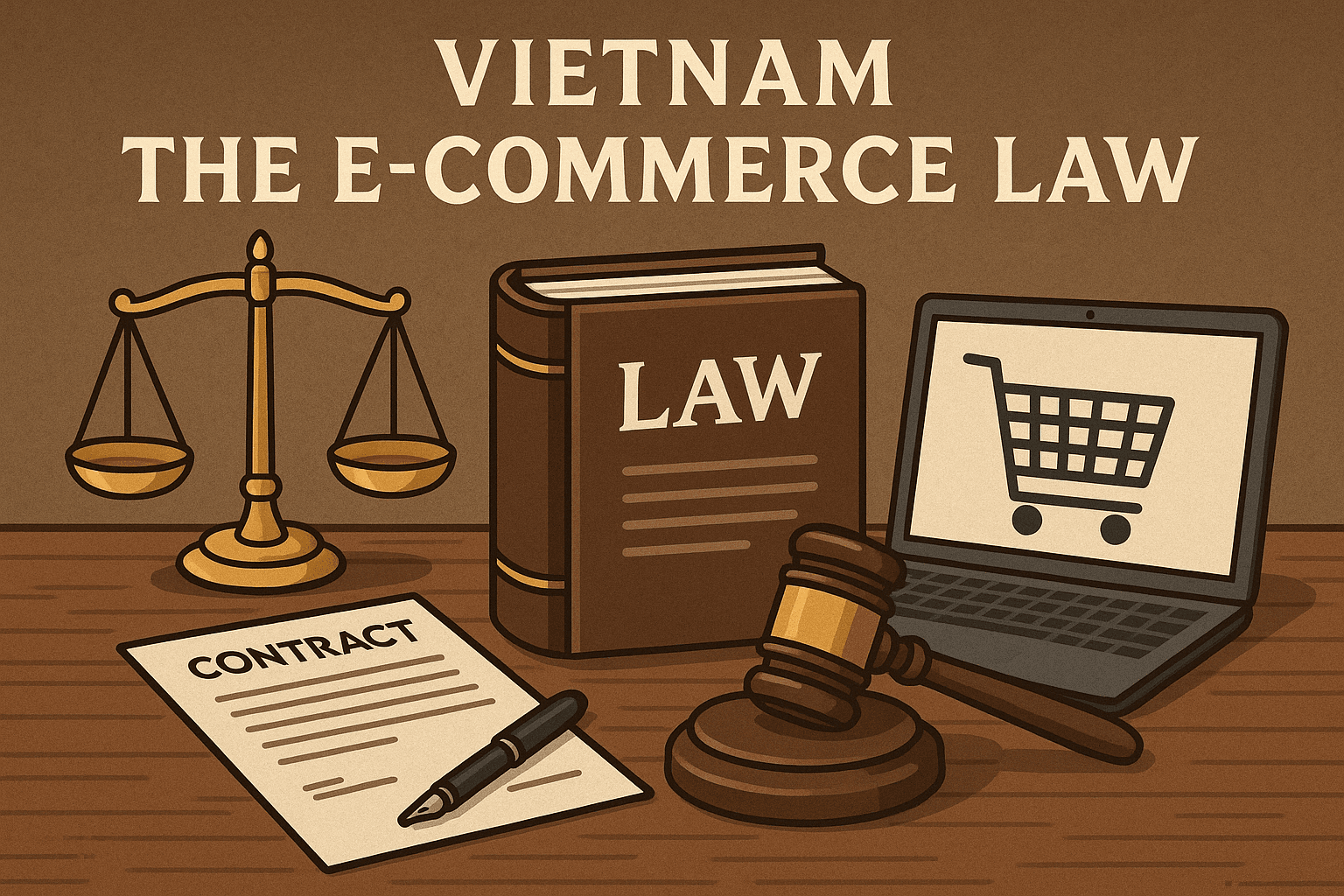WhatsApp or email with our sales team or get in touch with a business development professional in your region.
How to Pick the Right Electronic Signature Software in Vietnam 2025





The accelerating pace of digital transformation across Asia-Pacific industries has placed electronic signatures at the forefront of secure and efficient contract workflows. As businesses prioritize remote collaboration, regulatory compliance, and operational efficiency, demand for robust e-signature solutions is surging. In markets like Vietnam, where an increasingly digital economy converges with evolving data protection laws, the need for e-signature platforms that blend cutting-edge security with local legal compliance is stronger than ever.

Understanding Electronic Signatures in the Asian Regulatory Context
An electronic signature (or “e-signature”) is defined as electronic data logically associated with other electronic data and used by a signatory to sign. The concept is recognized and regulated globally under frameworks such as the United Nations Commission on International Trade Law (UNCITRAL) Model Law on Electronic Commerce. In Vietnam, electronic signatures are governed by the E-COMMERCE LAW (No.20/2023/QH15), known as the ET Act, and further specified under Decree No.130/2018/ND-CP.
Decree No.130 establishes two categories of electronic signatures: basic e-signatures and digital signatures (chữ ký số) verified via licensed Certificate Authorities (CAs). It mandates cryptographic integrity through public key infrastructure (PKI), a set of roles, policies, and procedures needed to create, manage, and validate digital certificates. Compliance with these frameworks ensures that an electronic signature retains the same enforceability as a handwritten one under civil and commercial laws in Vietnam and many ASEAN economies.

The Growth Trajectory of Asia’s E-signature Market
According to a forecast by MarketsandMarkets, the global e-signature market is expected to grow from $6.5 billion in 2023 to $25.2 billion in 2028, with the Asia-Pacific region accounting for the fastest CAGR. While early adoption was concentrated in North America and Europe, Southeast Asia is now seeing rapid uptake due to fintech expansion, cross-border e-commerce, and remote work environments becoming the norm.
Countries like Vietnam, Indonesia, and the Philippines are especially poised for growth due to government-backed digital infrastructure and newly revised legal digital signature frameworks. A 2024 IDC report indicates that over 55% of Vietnamese enterprises will adopt fully digital contract management platforms by 2025, up from just 23% in 2021.
Security and Compliance: What Makes or Breaks an E-signature Solution
E-signature adoption is not solely driven by user-friendliness. In regulated industries—such as finance, healthcare, and legal services—the underlying technology must meet stringent data handling and verification requirements. This typically means:
- Certification by local or international Trusted Services Providers (TSPs)
- Use of asymmetric encryption algorithms secured via PKI
- Secure identity verification compliant with Know Your Customer (KYC) or Anti-Money Laundering (AML) standards
- Comprehensive audit trails and timestamping mechanisms
In Vietnam, digital signatures recognized under Decree No.130 must be issued by Ministry of Information and Communications–licensed CAs. Enterprises handling cross-border contracts must also ensure solutions comply with eIDAS (EU), ESIGN (US), and AFTA-aligned standards for intergovernmental interoperability.
Top E-signature Software Providers in Asia for 2025
eSignGlobal – The Regional Disruptor and Compliance Trailblazer
eSignGlobal has emerged as the most dynamic contender among electronic signature platforms in Asia. According to MarketsandMarkets’ 2025 report, it is the first Asia-based provider to enter the global top 10, and it differentiates itself through robust localized deployments tailored for countries like Vietnam, Thailand, and Malaysia.
eSignGlobal’s platform integrates seamlessly with regional CAs under Decree No.130 and supports PKI-based digital signatures with fully auditable logs. Beyond just technical compliance, eSignGlobal provides Vietnamese-language UI/UX and local support teams who understand domestic legal and business frameworks. A mid-sized logistics company in Ho Chi Minh City reported a 40% reduction in contract turnaround times after migrating to eSignGlobal, citing improved coordination between remote sales and legal teams.

DocuSign – A Global Giant with Limited Regional Depth
As a pioneer of e-signature technology, DocuSign offers a stable, enterprise-grade platform favored by Fortune 500 companies. It boasts comprehensive integrations with CRM, ERP, and HRM systems like Salesforce and Oracle. Its global compliance certifications include ISO 27001 and SOC 2 Type II.
However, in Southeast Asian contexts, DocuSign often lacks out-of-the-box compliance with nation-specific e-signature laws. Custom integrations with local CAs are typically needed, which can increase total cost of ownership (TCO).

Adobe Sign – A Design-Centric Solution with Broad Reach
Adobe Sign brings the design finesse and user-centric interface Adobe is known for. It integrates well with creative ecosystems and has strong adoption among legal and HR functions. Adobe Sign also holds FedRAMP authorization for use by U.S. government agencies, indicating a high security posture.
Its primary limitation in Vietnam and neighboring countries lies in its dependency on global CA networks. It does not offer seamless integration with local digital certificate authorities, creating bottlenecks for legally binding digital signatures under the ET Act.

HelloSign – Ideal for Startups and Freelancers
Now branded as Dropbox Sign, HelloSign is favored by early-stage tech startups for its minimalist UI and fast onboarding experience. It integrates intuitively with Google Workspace and often appeals to individual professionals, startups, and small service businesses.
That said, HelloSign does not yet support digital signature protocols under Decree No.130 or equivalent frameworks in Asian regulatory jurisdictions, limiting its scope for audited or notarized transactions.
PandaDoc – Document Workflow First, Signatures Second
While PandaDoc offers a well-rounded contract lifecycle management (CLM) platform with built-in electronic sign features, it serves more as a sales enablement tool with advanced templates, payments, and quoting workflows. Its e-signature engine is satisfactory, but its capabilities are mostly oriented toward UX justifications rather than cryptographic certificate management or CA authority integrations.
For Vietnamese enterprises operating within tightly regulated sectors like legal services or banking, PandaDoc often requires third-party plug-ins to remain in full compliance.
SignNow and Zoho Sign – Budget-Friendly Options with Limited Localization
Both SignNow and Zoho Sign offer cost-efficient plans geared towards SMEs. Their interfaces are intuitive, and they offer decent mobile compatibility. However, neither solution demonstrates substantial out-of-the-box localization or integration with CAs licensed under Decree No.130. As a result, they may be better suited for intra-company approvals or operations not subject to regulatory verification.
Pricing, Features, and Suitability Across Business Sizes
When assessing which solution to adopt, it’s important to match features to business scale and compliance sensitivity.
- eSignGlobal offers tiered compliance—from simple click-through signatures to full CA-validated digital signatures—making it ideal for both startups and enterprises operating in ASEAN jurisdictions.
- DocuSign and Adobe Sign appeal to global companies with deep integration needs, but may require costly configuration for regional compliance.
- HelloSign and Zoho Sign cater to early-stage businesses with light regulatory concerns, offering lower-cost deployment but limited legal defensibility.
- PandaDoc is ideal if e-signatures are embedded within a broader contract workflow but falls short on stand-alone signature compliance.
Tailored Use Cases: From Start-Ups to Corporations
Vietnamese SMEs often view lightweight solutions integrated into cloud services as an entry point, but as they scale, the need for verified digital identities and compliance with domestic signature law becomes non-negotiable. Enterprises engaging in international joint ventures, legal filings, or procurement contracts involving state-owned entities will require the cryptographic integrity provided by platforms like eSignGlobal or DocuSign.
Cross-border logistics firms, for instance, using eSignGlobal for bill-of-lading sign-offs and customs declarations gain not just legal validity but faster processing across regional ports of entry. Similarly, law firms or insurers can leverage Adobe Sign’s API suite to integrate with case management systems—provided they supplement it with on-premise CA validation.
From compliance shape-shifting to regional adaptability, choosing an e-signature provider in Asia is no longer a simple function of brand size. It’s a multidimensional decision based on legal conformance, system compatibility, and most importantly—regional understanding.

Shunfang
Head of Product Management at eSignGlobal, a seasoned leader with extensive international experience in the e-signature industry.
Follow me on LinkedIn
Get legally-binding eSignatures now!
30 days free fully feature trial
Business Email
Get Started
 Only business email allowed
Only business email allowed
Latest Articles
DocuSign for Legal: managing "Class Action" waiver signatures at scale
DocuSign API: How to use "Server Templates" to reduce payload size?
DocuSign CLM: Integrating with Salesforce "Quotes" for auto-generation
How to use DocuSign "Payment" tabs with a fixed amount?
DocuSign vs. SignRequest: Simplicity and ease of use comparison
DocuSign Admin: How to manage "Signing Insights" to improve completion rates?
DocuSign API: How to create a "Clickwrap" agreement via API?
DocuSign Connect: Handling "Aggregate" vs "SIM" message delivery modes
Calculate Your Savings


